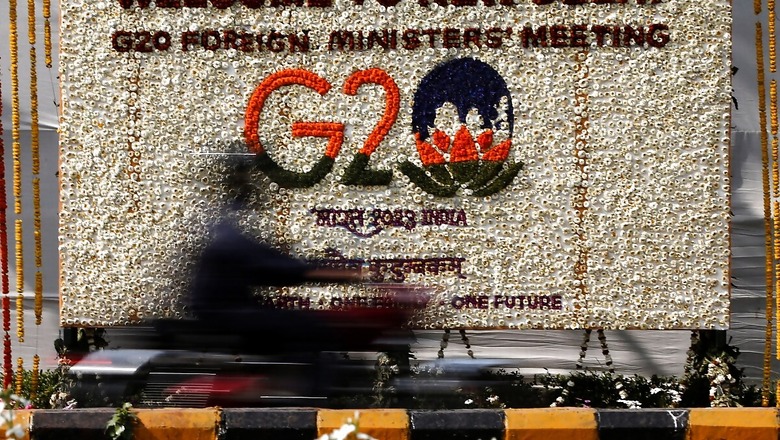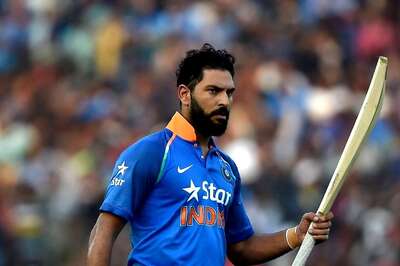
views
The subdued expectation that under India’s G20 presidency it might become possible to forge a consensus and issue joint communiqués, instead of summaries by the Chair as happened at Bali, has proved misplaced.
India had played a recognised role in helping to develop a consensus over the vexed Ukraine issue that made a joint communiqué at the G20 summit level possible. However, after the G20 Finance Ministers and Central Bank Governors (FMCBG) meeting in Bengaluru failed to agree on a joint communiqué and India had to issue a Chair’s summary, it became more or less clear that the same fate would befall the G20 Foreign Ministers meeting in New Delhi.
The G7 countries have shown a determination to raise a disruptive chorus of condemnation against Russia at every international meet, as if the Ukraine conflict constitutes the centre of gravity of international relations around which all other problems must rotate. Promises were made to India by major Western powers that they would help make India’s presidency of the G20 a success. “Success” would have meant finding a constructive way to bridge differences over Ukraine rather than insistence by the West on having its way. How can the G7 realistically expect Russia to help forge a consensus based on self-condemnation?
Whatever view one may have of Russia breaching international law and violating the sovereignty and territorial integrity of another UN member and, by extension the UN Charter, this is not the first time since 1945 that this has happened. Some of those accusing Russia have themselves invaded sovereign countries and violated the UN Charter numerous times on grounds of human rights, democracy promotion or terrorism. This has been done without UN approval and in most cases without their own security being directly threatened. The G7 countries resist admitting that their arguments against Russia are measured by others against their own conduct not only in the past, but even today.
The panoply of sanctions against Russia without UN approval has no international legality. They are as much responsible for the disruption of supply chains of food, fuel and fertilisers as is the conflict between Russia and Ukraine, both these countries being major suppliers of these commodities globally. To argue, as EU foreign and security policy chief Borrell has done again on the eve of the G 20 FM’s meeting in New Delhi, that Russia is lying about its role in causing food and fertiliser shortages is to gloss over EU’s own responsibility by denying access to its ports by Russian carriers and insurance cover by western companies, and part diversion of grains that were shipped out with UNSG’s intervention to some EU countries for alleged use as animal feed.
Much has been made by Borrell and other European leaders about ending all energy ties, indeed all economic ties, with Russia as a great strategic accomplishment. Seeking to create a permanent breach with the EU’s largest and most powerful neighbour, rich with oil, gas and other raw materials, with centuries of political, security, intellectual and cultural ties with Europe suggests in fact a failure of strategy. Where to place the blowing up Nord Stream 1 and 2 pipelines and no effort at all to investigate what amounts to a terrorist attack against critical civilian infrastructure?
As against this effort to “cancel” Russia, there is a pragmatic effort to preserve economic ties with China as a diplomatic, political and economic necessity, although China has been acting aggressively in South and East China Seas, bullying its neighbours, breaching bilateral agreements with India and provoking a conflict situation on the India-Tibet border, and even as China is described by EU as a systemic rival and European countries as well as the EU are flagging more robust Indo-Pacific strategies to counter Beijing.
The decline of multilateralism, without which the present interdependent international system cannot work, is a matter of concern to the international community, to the point that the UN devoted its 75th anniversary UNGA session to the revival of multilateralism. The UN Security Council is blocked in its functioning because of great power rivalries backed by the veto power vested in the five permanent members. The G20, without the veto handicapping its proceedings and a stable membership of the world’s biggest economies adequately distributed regionally, could forge a consensus on issues of financial stability and economic growth, which is its primary mandate. Bringing security issues into the discussions is an invitation to blockages even on those issues on which the members can agree. Why replicate the situation in the UN Security Council?
A pragmatic way out would be for the G20 to issue a joint communiqué on all issues on which they agree, seeing that at the G20 Foreign Ministers meeting there was, in the words of the Indian Foreign Minister, agreement on 95 percent of the text. India, in its Chair summary specifically mentioned that Russia and China were opposed to paras 3 and 4 on the Ukraine issue, culled from the Leaders’ Declaration at Bali. This formulation singled out Russia and China as opposing the position of the 18 other members, including India.
A better way out of such situations would be that on the text on which there is no agreement, as in the case of Ukraine, the Chair could issue a summary of discussions where the viewpoints of both sides could be spelt out. The insistence of the G7 to hold the rest of the text hostage to their demand for condemning Russia is to go down the path of making the G20 less and less relevant. The G20 was created to provide a platform to handle global financial and economic growth issues that the G7 could not handle adequately on its own and needed wider participation and coordination to develop policy options.
The outlook on the Ukraine conflict is filled with grave uncertainties, with the G7 promising support to Ukraine for as long as it takes and Russia seeking to consolidate its positions on the ground, with the likelihood of a renewed military offensive in spring. The accent seems to be more on escalation rather than dialogue. The G7 is flagging new concerns about China supplying lethal arms to Russia and the US and EU are threatening Beijing with punitive sanctions if this was done. Between now and in September when the G20 summit is held the likelihood of tensions over Ukraine easing is much less than an exacerbation of the situation, especially if Russia makes gains. This forebodes ill for the prospect of any G20 summit level communiqué. If the summit fails to issue one, it could well mean the effective political demise of the G 20 as a forum.
India has raised its stakes in the G20 by giving it a huge national profile. It has also assumed the leadership of the Global South in the G20 discussions, which raises that profile internationally. Despite the absence of joint communiqués after the meeting of the FMCBGs and the Foreign Ministers, the Chair’s summaries list the consensus on tackling issues of debt, Sustainable Development goals, terrorism, revitalization of multilateralism, reforming the WTO, food and energy security, climate change and biodiversity, global health, development cooperation, new and emerging technologies, counter-narcotics, global skill mapping, humanitarian assistance and disaster risk reduction, gender equality and women’s empowerment, etc. Consensus doesn’t mean solutions as the issues are complex and figure on a variety of multilateral, plurilateral and bilateral platforms and huge amounts of work lies ahead to progress on them.
What impact India’s decision to include a paragraph on Ukraine in the declaration issued by the Quad Foreign Ministers after their meeting in New Delhi will have on its role to forge a consensus when the G20 summit takes place remains to be seen.
Kanwal Sibal is a former Indian Foreign Secretary. He was India’s Ambassador to Turkey, Egypt, France and Russia. The views expressed in this article are those of the author and do not represent the stand of this publication.
Read all the Latest Opinions here


















Comments
0 comment